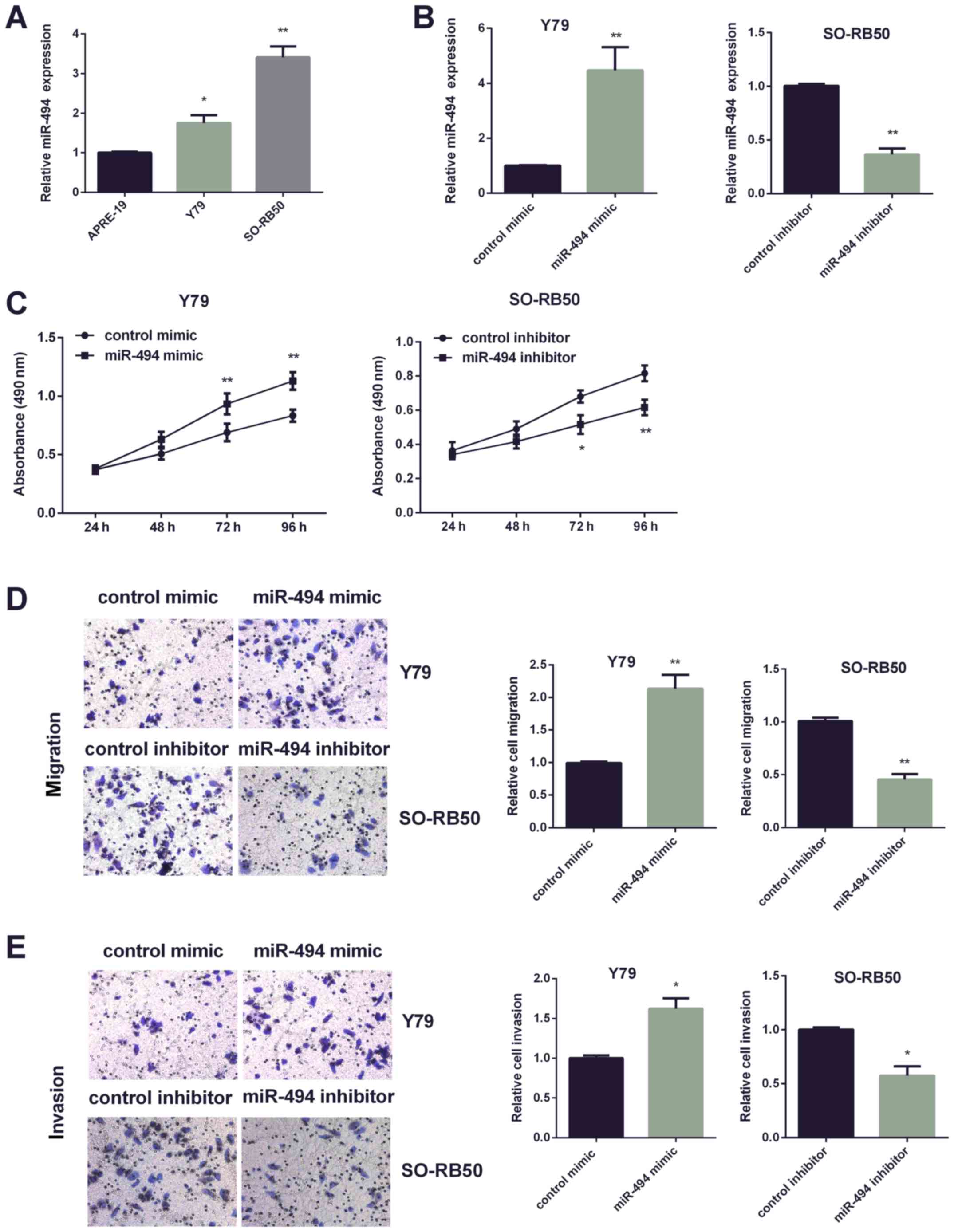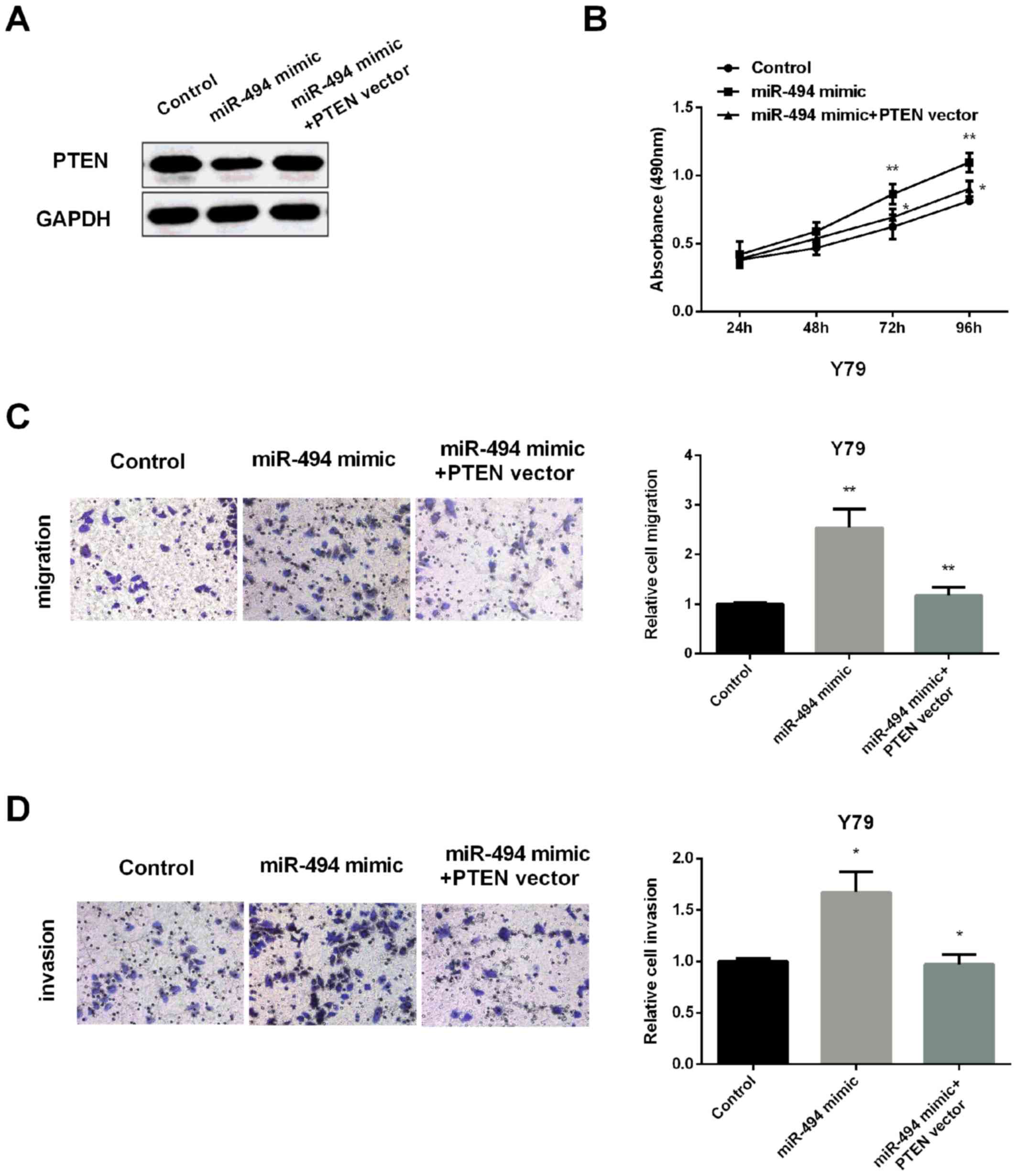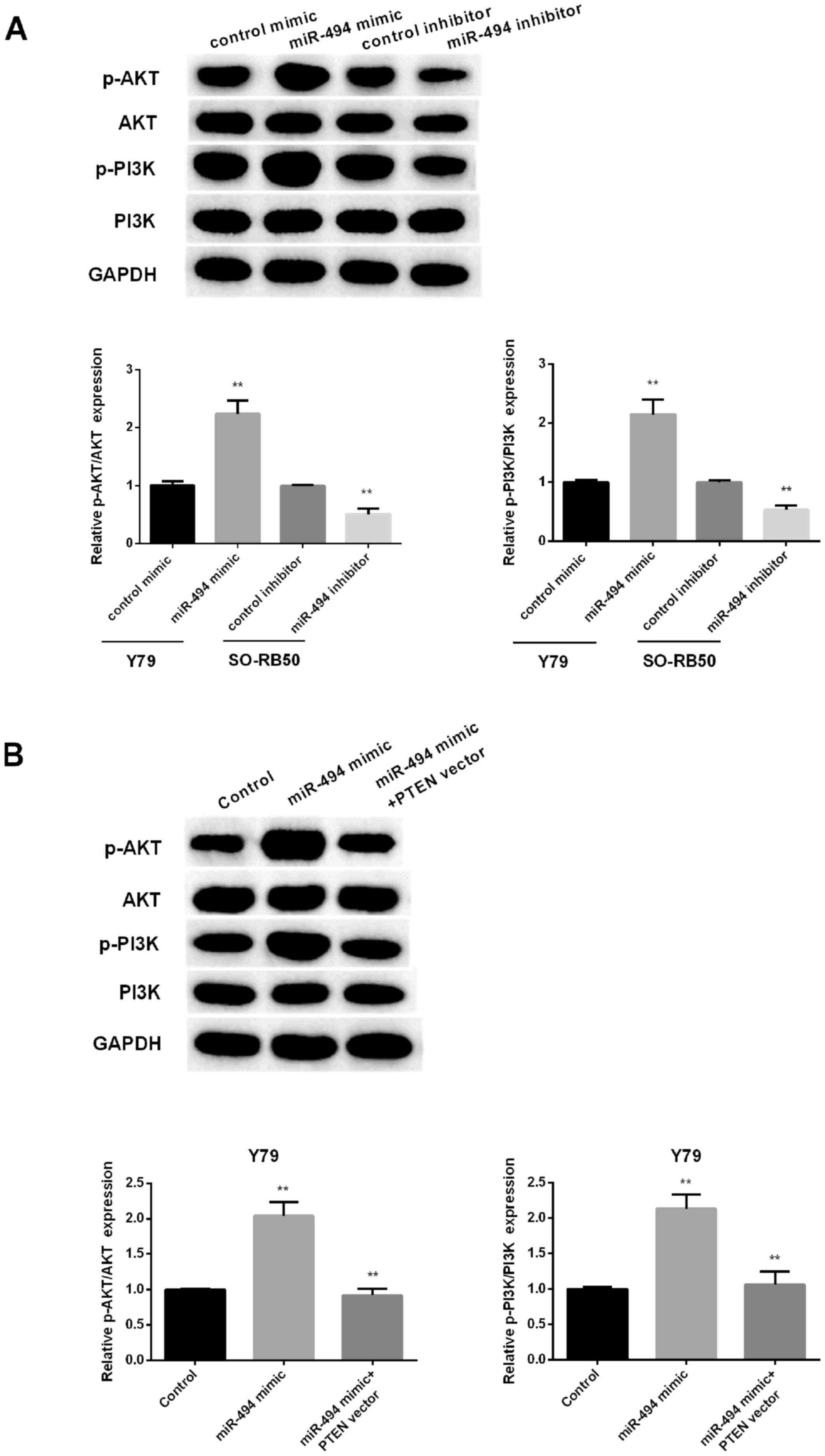|
1
|
Dimaras H, Dimba EA and Gallie BL:
Challenging the global retinoblastoma survival disparity through a
collaborative research effort. Br J Ophthalmol. 94:1415–1416. 2010.
View Article : Google Scholar : PubMed/NCBI
|
|
2
|
Kivelä T: The epidemiological challenge of
the most frequent eye cancer: Retinoblastoma, an issue of birth and
death. Br J Ophthalmol. 93:1129–1131. 2009. View Article : Google Scholar : PubMed/NCBI
|
|
3
|
Narang S, Mashayekhi A, Rudich D and
Shields CL: Predictors of long-term visual outcome after
chemoreduction for management of intraocular retinoblastoma. Clin
Exp Ophthalmol. 40:736–742. 2012. View Article : Google Scholar : PubMed/NCBI
|
|
4
|
Shinohara ET, DeWees T and Perkins SM:
Subsequent malignancies and their effect on survival in patients
with retinoblastoma. Pediatr Blood Cancer. 61:116–119. 2014.
View Article : Google Scholar : PubMed/NCBI
|
|
5
|
Stupp R, Mason WP, van den Bent MJ, Weller
M, Fisher B, Taphoorn MJ, Belanger K, Brandes AA, Marosi C, Bogdahn
U, et al European Organisation for Research and Treatment of Cancer
Brain Tumor and Radiotherapy Groups; National Cancer Institute of
Canada Clinical Trials Group, : Radiotherapy plus concomitant and
adjuvant temozolomide for glioblastoma. N Engl J Med. 352:987–996.
2005. View Article : Google Scholar : PubMed/NCBI
|
|
6
|
Holland EC: Gliomagenesis: Genetic
alterations and mouse models. Nat Rev Genet. 2:120–129. 2001.
View Article : Google Scholar : PubMed/NCBI
|
|
7
|
Liu S, Hu C, Wang Y, Shi G, Li Y and Wu H:
miR-124 inhibits proliferation and invasion of human retinoblastoma
cells by targeting STAT3. Oncol Rep. 36:2398–2404. 2016. View Article : Google Scholar : PubMed/NCBI
|
|
8
|
Wang L, Lyu X, Ma Y, Wu F and Wang L:
MicroRNA 504 targets AEG 1 and inhibits cell proliferation and
invasion in retinoblastoma. Mol Med Rep. 19:2935–2942.
2019.PubMed/NCBI
|
|
9
|
Guo L, Bai Y, Ji S and Ma H: MicroRNA 98
suppresses cell growth and invasion of retinoblastoma via targeting
the IGF1R/k Ras/Raf/MEK/ERK signaling pathway. Int J Oncol.
54:807–820. 2019.PubMed/NCBI
|
|
10
|
Golabchi K, Soleimani-Jelodar R, Aghadoost
N, Momeni F, Moridikia A, Nahand JS, Masoudifar A, Razmjoo H and
Mirzaei H: MicroRNAs in retinoblastoma: Potential diagnostic and
therapeutic biomarkers. J Cell Physiol. 233:3016–3023. 2018.
View Article : Google Scholar : PubMed/NCBI
|
|
11
|
Yu F, Pang G and Zhao G: ANRIL acts as
onco-lncRNA by regulation of microRNA-24/c-Myc, MEK/ERK and
Wnt/β-catenin pathway in retinoblastoma. Int J Biol Macromol.
128:583–592. 2019. View Article : Google Scholar : PubMed/NCBI
|
|
12
|
Sun Z, Zhang A and Zhang L: Inhibition of
microRNA 492 attenuates cell proliferation and invasion in
retinoblastoma via directly targeting LATS2. Mol Med Rep.
19:1965–1971. 2019.PubMed/NCBI
|
|
13
|
Wang J, Wang X, Li Z, Liu H and Teng Y:
MicroRNA-183 suppresses retinoblastoma cell growth, invasion and
migration by targeting LRP6. FEBS J. 281:1355–1365. 2014.
View Article : Google Scholar : PubMed/NCBI
|
|
14
|
Dalgard CL, Gonzalez M, deNiro JE and
O'Brien JM: Differential microRNA-34a expression and tumor
suppressor function in retinoblastoma cells. Invest Ophthalmol Vis
Sci. 50:4542–4551. 2009. View Article : Google Scholar : PubMed/NCBI
|
|
15
|
Zhao JJ, Yang J, Lin J, Yao N, Zhu Y,
Zheng J, Xu J, Cheng JQ, Lin JY and Ma X: Identification of miRNAs
associated with tumorigenesis of retinoblastoma by miRNA microarray
analysis. Childs Nerv Syst. 25:13–20. 2009. View Article : Google Scholar : PubMed/NCBI
|
|
16
|
Li J, Yen C, Liaw D, Podsypanina K, Bose
S, Wang SI, Puc J, Miliaresis C, Rodgers L, McCombie R, et al:
PTEN, a putative protein tyrosine phosphatase gene mutated in human
brain, breast, and prostate cancer. Science. 275:1943–1947. 1997.
View Article : Google Scholar : PubMed/NCBI
|
|
17
|
Tay Y, Kats L, Salmena L, Weiss D, Tan SM,
Ala U, Karreth F, Poliseno L, Provero P, Di Cunto F, et al:
Coding-independent regulation of the tumor suppressor PTEN by
competing endogenous mRNAs. Cell. 147:344–357. 2011. View Article : Google Scholar : PubMed/NCBI
|
|
18
|
Xu W, Yang Z, Zhou SF and Lu N:
Posttranslational regulation of phosphatase and tensin homolog
(PTEN) and its functional impact on cancer behaviors. Drug Des
Devel Ther. 8:1745–1751. 2014. View Article : Google Scholar : PubMed/NCBI
|
|
19
|
Wu W, Yang J, Feng X, Wang H, Ye S, Yang
P, Tan W, Wei G and Zhou Y: MicroRNA-32 (miR-32) regulates
phosphatase and tensin homologue (PTEN) expression and promotes
growth, migration, and invasion in colorectal carcinoma cells. Mol
Cancer. 12:302013. View Article : Google Scholar : PubMed/NCBI
|
|
20
|
Wang ZX, Lu BB, Wang H, Cheng ZX and Yin
YM: MicroRNA-21 modulates chemosensitivity of breast cancer cells
to doxorubicin by targeting PTEN. Arch Med Res. 42:281–290. 2011.
View Article : Google Scholar : PubMed/NCBI
|
|
21
|
Ma F, Zhang J, Zhong L, Wang L, Liu Y,
Wang Y, Peng L and Guo B: Upregulated microRNA-301a in breast
cancer promotes tumor metastasis by targeting PTEN and activating
Wnt/β-catenin signaling. Gene. 535:191–197. 2014. View Article : Google Scholar : PubMed/NCBI
|
|
22
|
Rong D, Lu C, Zhang B, Fu K, Zhao S, Tang
W and Cao H: CircPSMC3 suppresses the proliferation and metastasis
of gastric cancer by acting as a competitive endogenous RNA through
sponging miR-296-5p. Mol Cancer. 18:252019. View Article : Google Scholar : PubMed/NCBI
|
|
23
|
Akgun S, Kucuksayan H, Ozes ON, Can O,
Alikanoglu AS, Yildiz M and Akca H: NF-κB-induced upregulation of
miR-548as-3p increases invasion of NSCLC by targeting PTEN.
Anticancer Agents Med Chem. 19:1058–1068. 2019. View Article : Google Scholar : PubMed/NCBI
|
|
24
|
Zhao YS, Yang WC, Xin HW, Han JX and Ma
SG: MiR-182-5p knockdown targeting PTEN inhibits cell proliferation
and invasion of breast cancer cells. Yonsei Med J. 60:148–157.
2019. View Article : Google Scholar : PubMed/NCBI
|
|
25
|
Zhu L, Wang X, Wang T, Zhu W and Zhou X:
miR-494-3p promotes the progression of endometrial cancer by
regulating the PTEN/PI3K/AKT pathway. Mol Med Rep. 19:581–588.
2019.PubMed/NCBI
|
|
26
|
Zhang Q, Li Y, Zhao M, Lin H, Wang W, Li
D, Cui W, Zhou C, Zhong J and Huang C: MiR-494 acts as a tumor
promoter by targeting CASP2 in non-small cell lung cancer. Sci Rep.
9:30082019. View Article : Google Scholar : PubMed/NCBI
|
|
27
|
He H, Liao X, Yang Q, Liu Y, Peng Y, Zhong
H, Yang J, Zhang H, Yu Z, Zuo Y, et al: MicroRNA-494-3p promotes
cell growth, migration, and invasion of nasopharyngeal carcinoma by
targeting Sox7. Technol Cancer Res Treat. Jan 1–2018.(Epub ahead of
print). doi: 10.1177/1533033818809993. View Article : Google Scholar
|
|
28
|
Shen Z, Li Y, Zhao C, Wang F, Zhou R and
Chen G: miR-494 BAG 1 axis is involved in cinobufacini induced cell
proliferation and apoptosis in gastric cancer. Mol Med Rep.
17:7435–7441. 2018.PubMed/NCBI
|
|
29
|
Cheng L, Kong B, Zhao Y and Jiang J:
miR-494 inhibits cervical cancer cell proliferation through
upregulation of SOCS6 expression. Oncol Lett. 15:3075–3080.
2018.PubMed/NCBI
|
|
30
|
Zhang Y, Guo L, Li Y, Feng GH, Teng F, Li
W and Zhou Q: MicroRNA-494 promotes cancer progression and targets
adenomatous polyposis coli in colorectal cancer. Mol Cancer.
17:12018. View Article : Google Scholar : PubMed/NCBI
|
|
31
|
Lee YR, Chen M and Pandolfi PP: The
functions and regulation of the PTEN tumour suppressor: New modes
and prospects. Nat Rev Mol Cell Biol. 19:547–562. 2018. View Article : Google Scholar : PubMed/NCBI
|
|
32
|
Schroeder C, Grell J, Hube-Magg C, Kluth
M, Lang D, Simon R, Höflmayer D, Minner S, Burandt E, Clauditz TS,
et al: Aberrant expression of the microtubule-associated protein
tau is an independent prognostic feature in prostate cancer. BMC
Cancer. 19:1932019. View Article : Google Scholar : PubMed/NCBI
|
|
33
|
Kim TH, Park JH and Woo JS: Resveratrol
induces cell death through ROS dependent downregulation of
Notch1/PTEN/Akt signaling in ovarian cancer cells. Mol Med Rep.
19:3353–3360. 2019.PubMed/NCBI
|
|
34
|
Cao Y, Xia F, Wang P and Gao M: MicroRNA
93-5p promotes the progression of human retinoblastoma by
regulating the PTEN/PI3K/AKT signaling pathway. Mol Med Rep.
18:5807–5814. 2018.PubMed/NCBI
|
|
35
|
Wei D, Miao Y, Yu L, Wang D and Wang Y:
Downregulation of microRNA-198 suppresses cell proliferation and
invasion in retinoblastoma by directly targeting PTEN. Mol Med Rep.
18:595–602. 2018.PubMed/NCBI
|
|
36
|
Lin A, Piao HL, Zhuang L, Sarbassov D, Ma
L and Gan B: FoxO transcription factors promote AKT Ser473
phosphorylation and renal tumor growth in response to pharmacologic
inhibition of the PI3K-AKT pathway. Cancer Res. 74:1682–1693. 2014.
View Article : Google Scholar : PubMed/NCBI
|
|
37
|
Spangle JM, Roberts TM and Zhao JJ: The
emerging role of PI3K/AKT-mediated epigenetic regulation in cancer.
Biochim Biophys Acta Rev Cancer. 1868:123–131. 2017. View Article : Google Scholar : PubMed/NCBI
|
|
38
|
Xie C, Lu H, Nomura A, Hanse EA, Forster
CL, Parker JB, Linden MA, Karasch C and Hallstrom TC: Co-deleting
Pten with Rb in retinal progenitor cells in mice results in fully
penetrant bilateral retinoblastomas. Mol Cancer. 14:932015.
View Article : Google Scholar : PubMed/NCBI
|
|
39
|
Kim BR, Ha J, Lee S, Park J and Cho S:
Anti-cancer effects of ethanol extract of Reynoutria
japonica Houtt. radix in human hepatocellular carcinoma cells
via inhibition of MAPK and PI3K/Akt signaling pathways. J
Ethnopharmacol. 245:1121792019. View Article : Google Scholar : PubMed/NCBI
|
|
40
|
Haddadi N, Lin Y, Travis G, Simpson AM,
Nassif NT and McGowan EM: PTEN/PTENP1: ‘Regulating the regulator of
RTK-dependent PI3K/Akt signalling’, new targets for cancer therapy.
Mol Cancer. 17:372018. View Article : Google Scholar : PubMed/NCBI
|
|
41
|
Fu X, Wen H, Jing L, Yang Y, Wang W, Liang
X, Nan K, Yao Y and Tian T: MicroRNA-155-5p promotes hepatocellular
carcinoma progression by suppressing PTEN through the PI3K/Akt
pathway. Cancer Sci. 108:620–631. 2017. View Article : Google Scholar : PubMed/NCBI
|



















